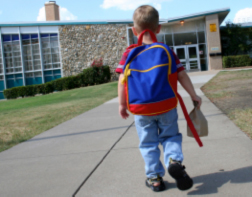Clinical Psychologist
Clinical psychologists have a graduate degree in professional psychology. Although most clinical psychologists have a Ph.D., some have a Master’s Degree. All clinical psychologists undergo supervised training after they graduate before they start to practice clinical psychology on their own. They have to register as psychologists and they may need to be licensed as well.
For children who are between the ages of six and twelve years, clinical psychologists do two things:
- Assessment: they assess children and provide a diagnosis for them that may be related to a mental health condition with either a mental illness (such as an anxiety disorder) or a developmental disability (such as an intellectual disability like Down syndrome);
- Intervention: they provide these children with psychotherapy. As we have seen in Module 2, many children with special needs or children who at risk for developmental delays may have a secondary diagnosis of a mental illness. When that happens, the clinical psychologist will offer the child therapy.
For more information about clinical psychology in British Columbia and Canada, please visit this website.
Counseling Psychologist
Counseling psychologists have a graduate degree in professional psychology. This allows them to “counsel” or offer advice to others. Most counseling psychologists help individuals who do not suffer from a mental illness, but who are going through a rough time for a wide variety of reasons. Such reasons include dealing with grief, struggling with grades, or having a hard time moving from one location to another. Counseling psychologists also help teenagers and adults with career choices.
Unlike clinical psychologists whose therapy sessions can last for years, counseling psychologists usually offer therapy sessions for a shorter amount of time. This is because they are usually not treating an individual but a situation the individual may be going through. For example, a clinical psychologist may help someone deal with an anxiety disorder. This could take years, and the individual may never be “cured”. For example, a counseling psychologist usually helps a child whose parents are going through a divorce. The child will learn and understand that the divorce is not his or her fault. He or she will also learn how to cope with all the new changes in his or her life. Once that goal is achieved, the therapy ends.
For more information about counseling psychologists in British Columbia, please visit the following website.
Deaf/Blind Specialist/Consultant
A deafblind consultant works with children and grown-ups who are both deaf and blind. The consultant usually also works very closely with the family of a child who is deafblind. He or she will help the family understand their child’s condition, and what having this condition means for everyday life. The consultant will help the family learn about methods for dealing with everyday life that have been developed specifically for the deafblind. The consultant will teach the child and his or family how to use these methods. Specifically, he or she can help the child and his or her family with:
- Dressing and undressing;
- Hygiene;
- Eating and drinking;
- Getting around the house or the neighborhood.
The deafblind specialist can also go to Individualized Education Plan IEP (see full Glossary) meetings at the child’s school, if asked by the child’s family. He or she will also help the deafblind child’s teachers make the classroom accessible. Specifically, he or she can help the child and the teachers with:
- Getting to and from the classroom;
- Being able to get around on school grounds;
- Using specialized and adaptive equipment to function well and independently in the classroom.
Deaf and Hard of Hearing Consultant (Teachers of the Deaf or Hard of Hearing-TDHH)
The deaf and hard of hearing consultant works with children who are either deaf or hard of hearing. He or she usually also works closely with the family of a child who is deaf or hard of hearing. The consultant will explain to the family what their child’s hearing and educational options are, depending on the child’s level of hearing loss The consultant can help the child and his or her family with:
- The use of any hearing equipment (Fig. 1), such as hearing aids;
- Making certain changes to the environment in order to allow the child to make use of any hearing he or she has.

Figure 1. Hearing aid
The consultant may go to Individual Education Plan IEP (see full Glossary) meetings with the family. He or she acts as an advocate for the family. He or she will also meet with the child’s teachers and help them make the classroom accessible to the child who is either deaf or hard of hearing. He or she can specifically help with:
- Making sure classroom acoustics (Fig. 2) allow the child to use whatever hearing he or she may have;
- Making changes that allow the child to be as independent as possible. Such changes include the use of adaptive equipment or special seating arrangements.

Figure 2. Classroom acoustics
Certified Auditory-Verbal Therapists (AVT):
The AVT is a trained specialist who works with children who are either deaf or hard of hearing. He or she will help a child with hearing loss learn how to communicate with others and how to understand what others are trying to tell them. The AVT will teach a child how to do this by:
- Helping the child use whatever hearing he or she may have to listen to others;
- Use any assistive device that the family has chosen, such as a hearing aid;
- Make the most out of a cochlear implant (see full Glossary) if the child has one.
The goal of the AVT is to help the child participate in everyday activities. This will allow the child to be included in all or most aspects of daily life. It also allows the child to be as independent as possible.
AVTs work directly with children, but they also work very closely with the child’s parents. Parents are usually the main teachers of language and communication skills in their children. With the help of AVTs, parents learn:
- How to help their children make the best use of whatever hearing they have;
- How to change the child’s environment to best help the child’s ability to learn;
- How to help their child monitor their speech and language patterns;
- How to use the environment to learn.
AVTs may also work with teachers to make sure the child who is deaf or hard of hearing can be included in the regular classroom as much as possible.
For more information about auditory-verbal therapy, please visit this website.



